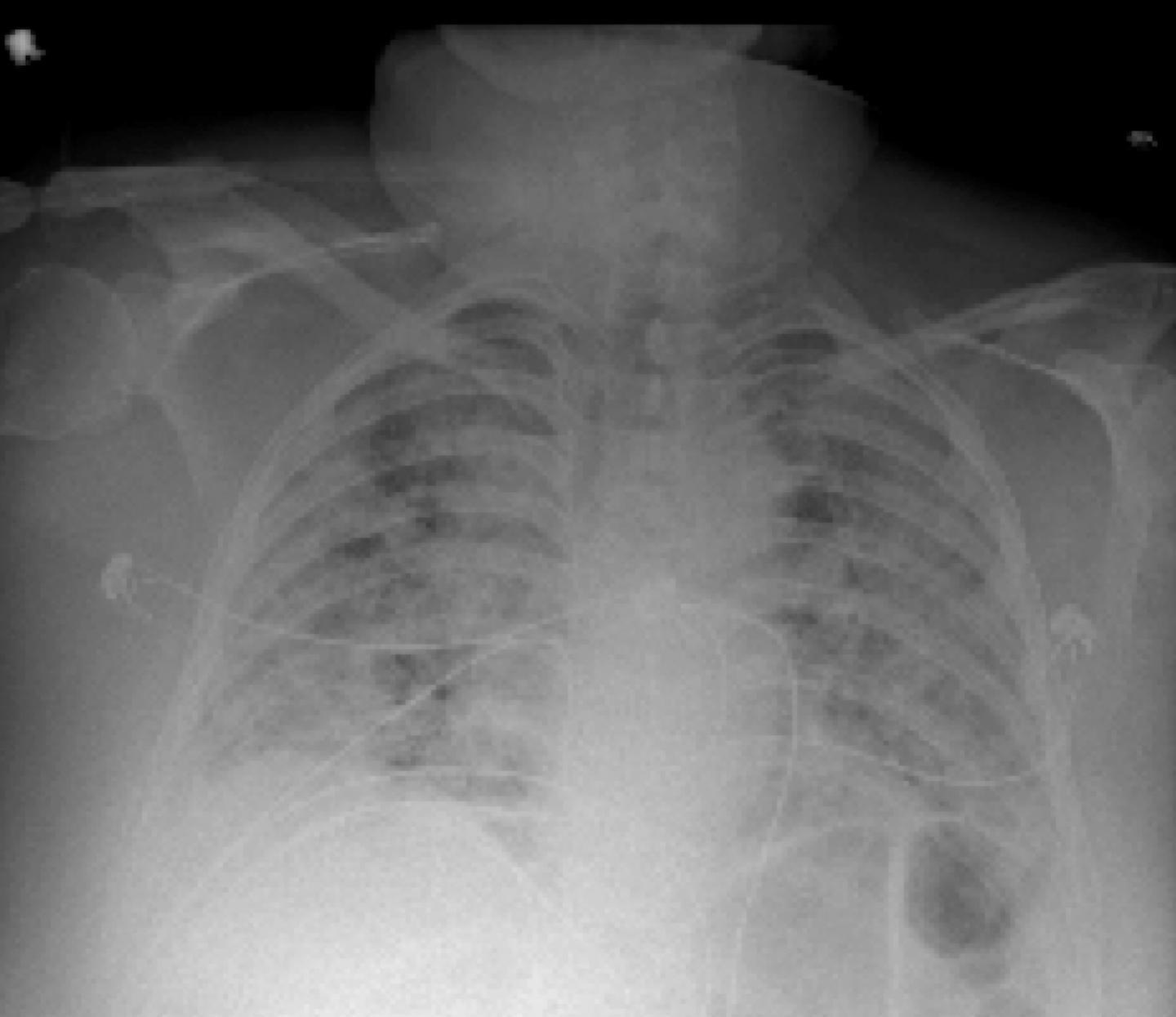May 13 2021
A new study has found that a computer program trained to observe patterns by examining thousands of chest X-rays estimated, with up to 80% precision, which patients with coronavirus disease (COVID-19) would develop fatal complications within 4 days.
 Chest X-ray from patient severely ill from COVID-19, showing (in white patches) infected tissue spread across the lungs. Image Credit: Courtesy of Nature Publishing or npj Digital Medicine.
Chest X-ray from patient severely ill from COVID-19, showing (in white patches) infected tissue spread across the lungs. Image Credit: Courtesy of Nature Publishing or npj Digital Medicine.
The program developed by scientists at NYU Grossman School of Medicine made use of several hundred gigabytes of data gleaned from 5,224 chest X-rays obtained from 2,943 severely ill patients infected with SARS-CoV-2, the virus responsible for the infections.
The study, which was reported by the authors in the journal npj Digital Medicine online on May 12th, 2021, reiterated the “pressing need” for the potential to rapidly forecast which patients with COVID-19 would probably develop fatal complications so that treatment resources can be matched in the best way to those at high risk.
For reasons that are not yet understood well, the health of a few patients with the disease worsens all of a sudden, needs intensive care, and elevates their probability of dying.
To tackle this requirement, the NYU Langone group loaded not only X-ray information into their computer analysis but also patients’ gender, race, and age together with various vital signs and laboratory test results, such as blood immune cell levels, body temperature, and weight.
Their mathematical models, which can learn from examples, considered the requirement for a mechanical ventilator and if each patient lived (2,405) or died (538) from their infections.
Furthermore, the team tested the predictive value of the software tool on 770 chest X-rays from 718 other patients who were admitted for COVID-19 via the emergency department at NYU Langone hospitals from March 3rd, 2020, to June 28th, 2020.
The computer program was able to precisely forecast four out of five infected patients who needed intensive care and mechanical ventilation and/or died within four days after getting admitted.
Emergency room physicians and radiologists need effective tools like our program to quickly identify those patients with COVID-19 whose condition is most likely to deteriorate quickly so that healthcare providers can monitor them more closely and intervene earlier.
Farah Shamout, PhD, Study Co-Lead Investigator and Assistant Professor, Computer Engineering, New York University
“We believe that our COVID-19 classification test represents the largest application of artificial intelligence in radiology to address some of the most urgent needs of patients and caregivers during the pandemic,” stated Yiqiu “Artie” Shen, MS, a doctoral student at the NYU Center for Data Science.
Krzysztof J. Geras, PhD, study senior investigator and an assistant professor in the Department of Radiology at NYU Langone, stated that a significant advantage to machine intelligence programs is that precision can be monitored, updated, and enhanced with more data.
He stated that the team intends to add more patient data as it becomes available. Moreover, Geras stated that the group is assessing what extra clinical test results could be utilized to enhance their test model.
Dr Geras believes that, through further study, NYU Langone’s COVID-19 classification test could soon be deployed for emergency radiologists and physicians. In the meantime, Geras has been collaborating with physicians to draft clinical guidelines for its use.
The study was financially supported by the National Institutes of Health grants P41 EB017183 and R01 LM013316, and National Science Foundation grants HDR-1922658 and HDR-1940097.
In addition to Dr Geras, Dr Shamout, and Shen, other NYU and NYU Langone scientists involved in this study are co-lead investigators Nan Wu, Aakash Kaku, Jungkyu Park, and Taro Makino.
The co-investigators of the study are Stanislaw Jastrzebski; Duo Wong; Ben Zhang; Siddhant Dogra; Men Cao; Narjes Sharif Razavian, PhD; David Kudlowitz, MD; Lea Azour, MD; William H. Moore, MD; Yvonne W. Lui, MD; Yindalon Aphinyanaphongs, MD, PhD; and Carlos Fernandez-Granda.
Journal Reference:
Shamout, F. E., et al. (2021) An artificial intelligence system for predicting the deterioration of COVID-19 patients in the emergency department. npj Digital Medicine. doi.org/10.1038/s41746-021-00453-0.